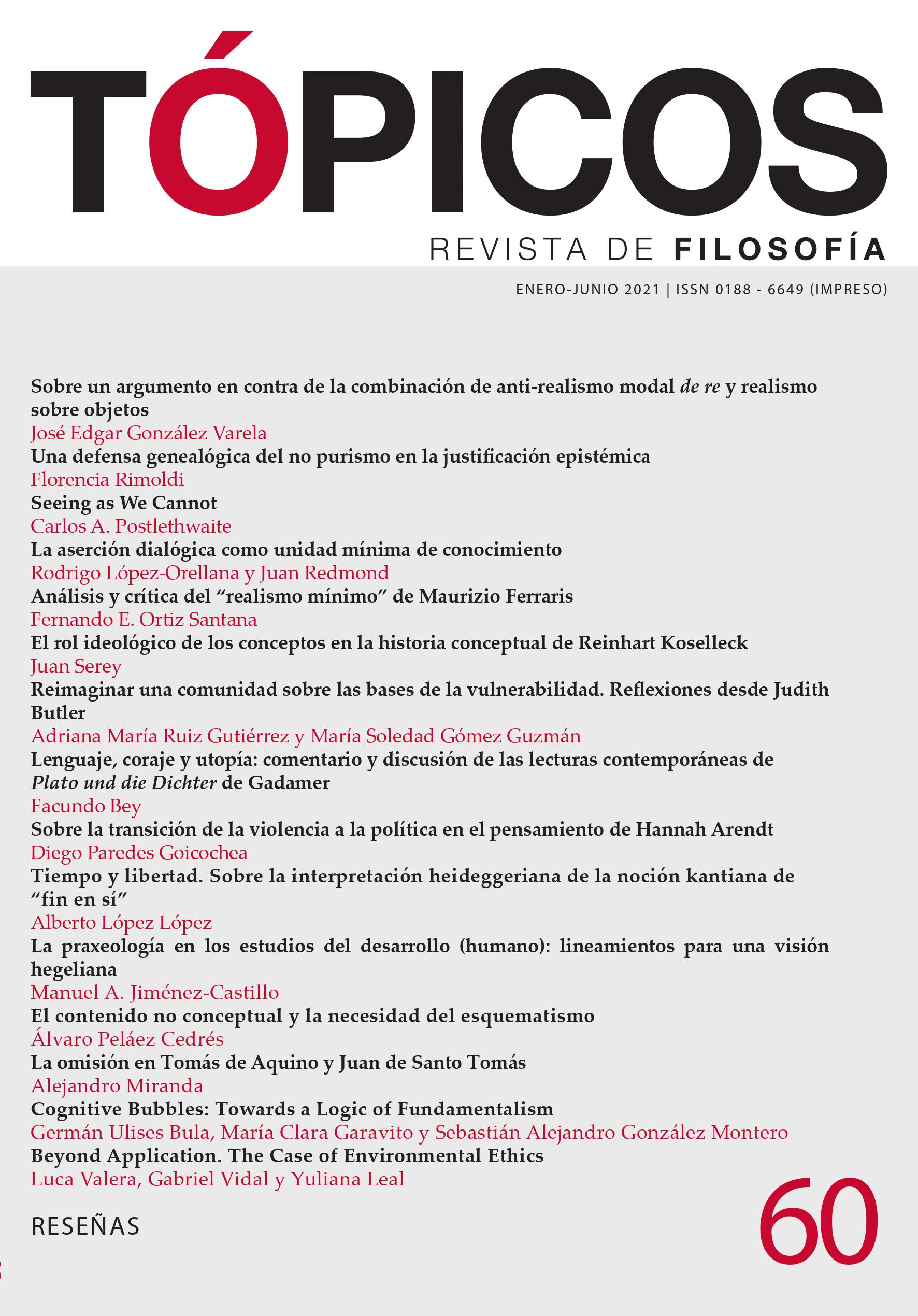Published 2020-10-27
Keywords
- justification,
- belief,
- action,
- genealogy
How to Cite
Abstract
In this work I propose and defend a non-purist conception of epistemic justification according to which the latter depends in part on non truth-conducive factors, such as the pragmatic context of people. To do so, I present three distinct perspectives on the notion of justified belief. In the first section I analyze the most salient aspects of the pre-theoretical notion. In the second section I defend a non-purist permisive view that recovers the elements of the pre-theoretic view in a theoretical manner and extends them towards non -purism. In the third section I defend this latter view by means of a genealogical account of the origin of the concept of justification.
References
- Alston, W. P. (2005). Beyond “Justification”. Dimensions of Epistemic Evaluation. Cornell University Press.
- Audi, R. (2003). Epistemology. A Contemporary Introduction to the Theory of Knowledge. Routledge.
- Bonjour, L. (1985). The Structure of Empirical Knowledge. Macmillan.
- Chisholm, R. M. (1976). Theory of Knowledge. Prentice Hall.
- Clifford, W. K. (1999). The Ethics of Belief. En T. Madigan (ed.), The Ethics of Belief and Other Essays. (pp. 70-96). Prometheus.
- Craig, E. (1990). Knowledge and the State of Nature. An Essay in Conceptual Synthesis. Clarendon Press.
- Chignell, A. (2018). The Ethics of Belief. En Edward N. Zalta (ed.), The Stanford Encyclopedia of Philosophy. URL: https://plato.stanford.edu/archives/spr2018/entries/ethics-belief/.
- Cohen, S. (1984). Justification and Truth. Philosophical Studies, 46, 279–295.
- Conee, E. y Feldman, R. (1985). Evidentialism. Philosophical Studies, 48, 15-35.
- David, P. (2001). Evidentialism reconsidered. Noûs, 35, 239–259.
- Fantl, J. y McGrath, M. (2002). Evidence, Pragmatics, and Justification, The Philosophical Review, 111, 67-94.
- Fantl, J. y McGrath, M. (2009). Knowledge in an Uncertain World. Oxford University Press.
- Fantl, J. y McGrath, M. (2012). Pragmatic Encroachment: It´s not Just About Knowledge. Episteme, 9(1), 27-42.
- Foley, R. (2001). Intellectual Trust in Oneself and Others. Cambridge University Press.
- Fricker, M. (2007). Epistemic Injustice. Power and the Ethics of Knowing. Oxford University Press.
- Goldman, A. (2000). What is Justified Belief? En E. Sosa y J. Kim (eds.), Epistemology. An Anthology. (pp. 340-353). Wiley-Blackwell.
- Harman, G. (1999). Rationality. En Reasoning, Meaning, and Mind. (pp. 9-45). Clarendon Press.
- Haslanger, S. (2005). What are We Talking About? The Semantics and Politics of Social Kinds. Hypatia, 20(4), 10-26.
- Hawthorne, J. y Stanley, J. (2008). Knowledge and Action. The Journal of Philosophy, 105(10), 571-590.
- Kelly, T. (2016). Evidence. En Edward N. Zalta (ed.), The Stanford Encyclopedia of Philosophy. URL: https://plato.stanford.edu/archiveswin2016/entries/evidence/.
- Kusch, M. (2009). Testimony and the Value of Knowledge. En A. Haddock, A. Millar y D. Pritchard (eds.), Epistemic Value. (pp. 60-94). Oxford University Press.
- Moran, R. (2006). Getting Told and Being Believed. En J. Lackey y E. Sosa (eds.), The Epistemology of Testimony. (pp. 272-306). Oxford University Press.
- Nozick, R. (1981). Philosophical Explanations. Oxford University Press.
- Peirce, C. S. (1877). The Fixation of Belief. Popular Science Monthly, 12, 1-15.
- Plantinga, A. (1993). Warrant: The Current Debate. Oxford University Press.
- Pollock, J. (1986). Contemporary Theories of Knowledge. Rowman & Littlefield.
- Pryor, J. (2001). Highlights of Recent Epistemology. British Journal for the Philosophy of Science, 52, 95–124.
- Reisner, A. (2009). The Possibility of Pragmatic Reasons for Belief and the Wrong Kind of Reasons Problem. Philosophical Studies, 145, 257–272.
- Reisner, A. (2017). Pragmatic Reasons for Belief. En D. Star (ed.), The Oxford Handbook of Reasons and Normativity. (pp. 705-730). Oxford University Press.
- Rimoldi, F. (2014). ¿Puede el conocimiento ser un estado mental? Análisis Filosófico, 34(2),171-201.
- Rimoldi, F. (2018). El valor del conocimiento: un método y una explicación. En L. Ruivo (ed.), Proceedings of the Brazilian Research Group on Epistemology 2018. Social Epistemology. (pp. 39-72). Editora Fi.
- Sosa, E. (2015). Judgment and Agency. Oxford University Press.
- Stanley, J. (2005). Knowledge and Practical Interests. Oxford University Press.
- Williams, B. (2002). Truth and Truthfulness. An Essay in Genealogy. Princeton University Press.
- Williamson, T. (2000). Knowledge and its Limits. Oxford University Press.







